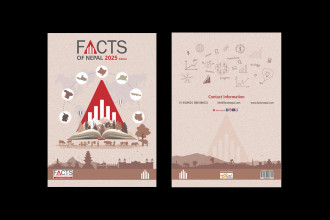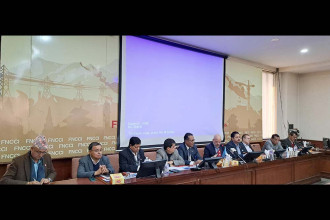
- Cooperative organisations can provide loans to members with regular savings up to five times their savings amount or maximum of Rs 300,000, whichever is less
KATHMANDU: Nepal Rastra Bank (NRB) has unveiled a draft with new standards to manage the savings and credit of cooperative organisations, following the government’s issuance of a new ordinance relating to cooperative sector management.
To maintain transparency and balance in the fiscal activities of the struggling cooperative sector, the central bank on Monday released the draft 'Directive and Standards for Cooperative Organisations with Savings and Credit Transactions'.
According to the draft standards, cooperatives can collect savings only from their members, set savings collection limits according to their scope, tighten loan investment, and focus on investment in the productive sector.
The NRB has stated that the draft aims to ensure discipline and transparency in the cooperative sector.
Suggestions or inputs on the draft are requested by February 12. It is expected that the provision to completely prohibit the collection of savings from non-members, except those specified in the draft, and to allow collection only within a certain limit, will end the practice of collecting risky savings from non-members.
"A cooperative organisation dealing with savings and credit can collect savings only from its members, while such an organisation can collect savings up to 15 times the primary capital fund. Institutions can borrow up to 5% of total assets or up to a maximum of 100% of the capital fund from banks and financial institutions (BFIs)," the draft states.
The savings collection limit of organisations dealing with savings and credit has also been set. A cooperative with jurisdiction in one district can collect savings up to Rs 1 million, Rs 2.5 million if it has jurisdiction in more than one district, and up to Rs 5 million if it has multiple jurisdictions.
According to the draft, organisations can operate ordinary and regular types of savings accounts, and members of cooperatives must disclose the source of any deposit exceeding Rs 1 million.
Similarly, credit flow is also to be tightened. "Cooperatives dealing with savings and credit will not be able to invest loans in members whose membership has not exceeded three months. The organisation shall not lend more than 15% of the primary capital fund per member," the draft notes.
Additionally, organisations can provide loans to members with regular savings up to five times their savings amount or a maximum of Rs 300,000, whichever is less. A provision is being made to require the deposit of at least two members while issuing loans without collateral, and directors will not be able to take any additional loans beyond those protected by their savings.
The organisation can provide loans to regular depositors amounting to a maximum of Rs 300,000 or five times their savings amount without collateral.
According to the draft, savings and credit cooperatives can invest in shares of cooperative banks, small farmers' microfinance institutions, and government-issued bonds.
Apart from this, no investment will be allowed in the shares and debentures of any other organisation. Cooperative organisations will also face tightened regulations on real estate purchases, as stated in the draft.
"Land or buildings equivalent to a maximum of 25% of the primary capital or a maximum of 50% of the reserve fund can be purchased or constructed for office purposes, provided the organisation has been operating continuously for the last three years with a net profit without reserved loss."
Additionally, emphasis has been placed on expanding sectoral credit. "Organisations with large businesses, other than specialised institutions, will have to disburse at least 50% of the total loan to productive sectors, including agriculture, industry, and business operation and expansion," reads the draft.
Savings and credit organisations will be able to provide loans up to a maximum of 90% to protect the savings of members.
According to the draft, loans up to a maximum of 50% of the collateral value in metropolitan and sub-metropolitan cities and up to 60% in municipalities and rural municipalities can be provided when issuing loans against the mortgage of immovable property.
Provisions related to loan restructuring and rescheduling of savings and credit cooperatives have also been included in the draft.






